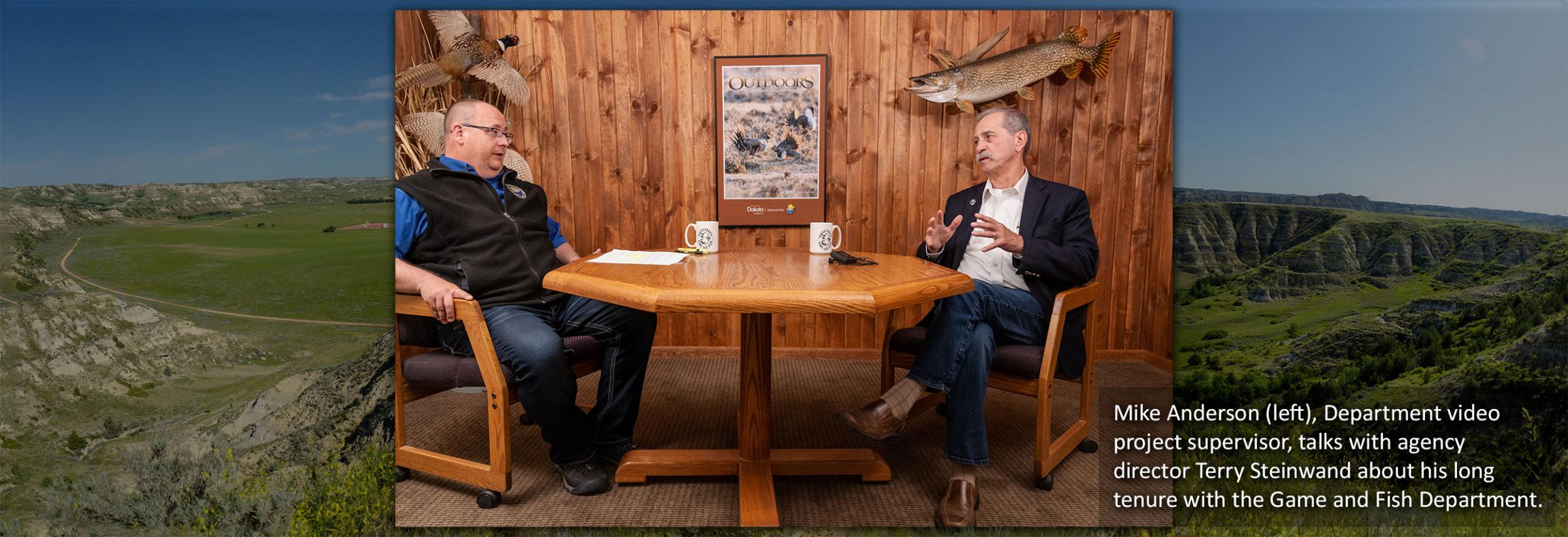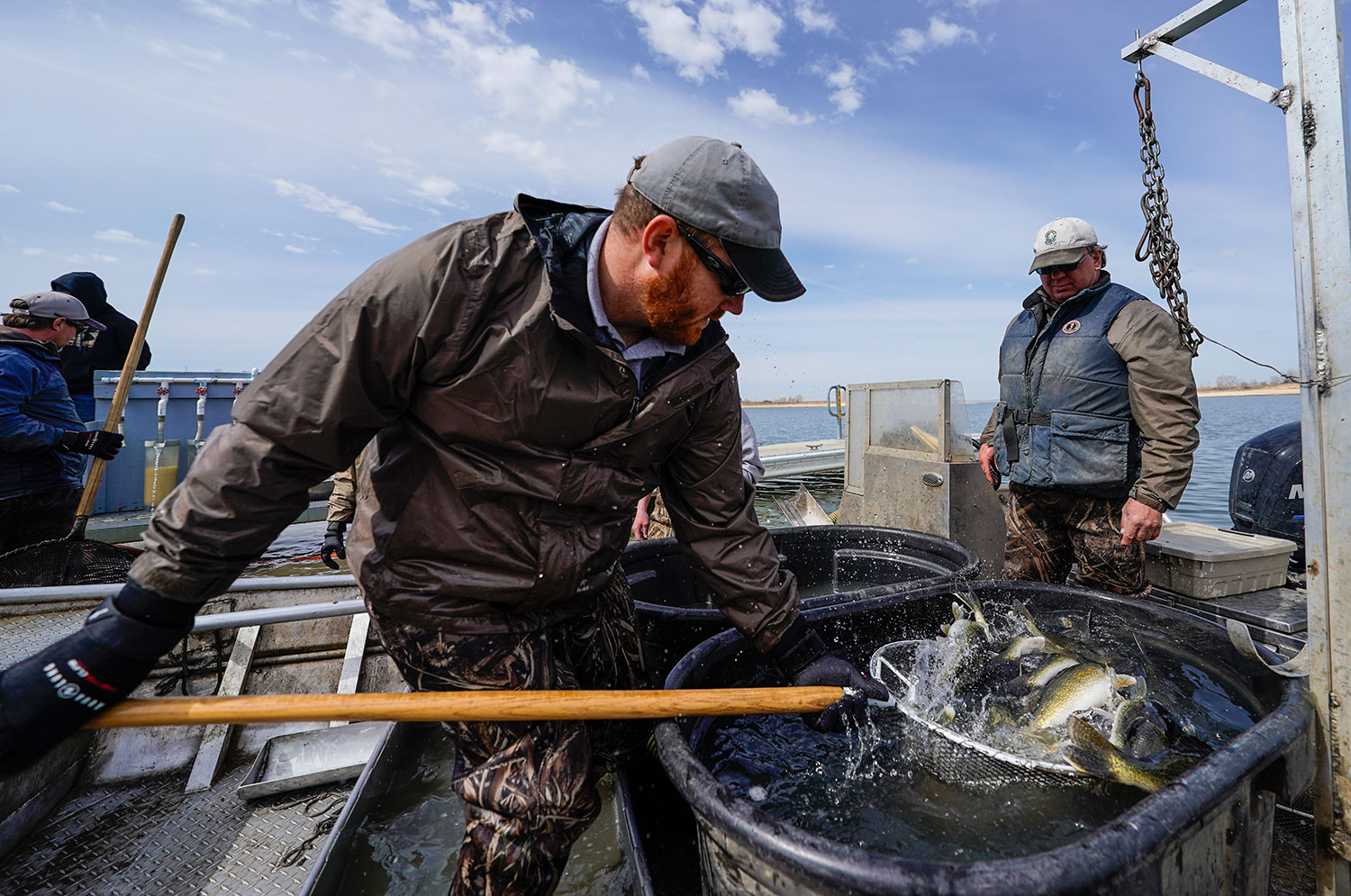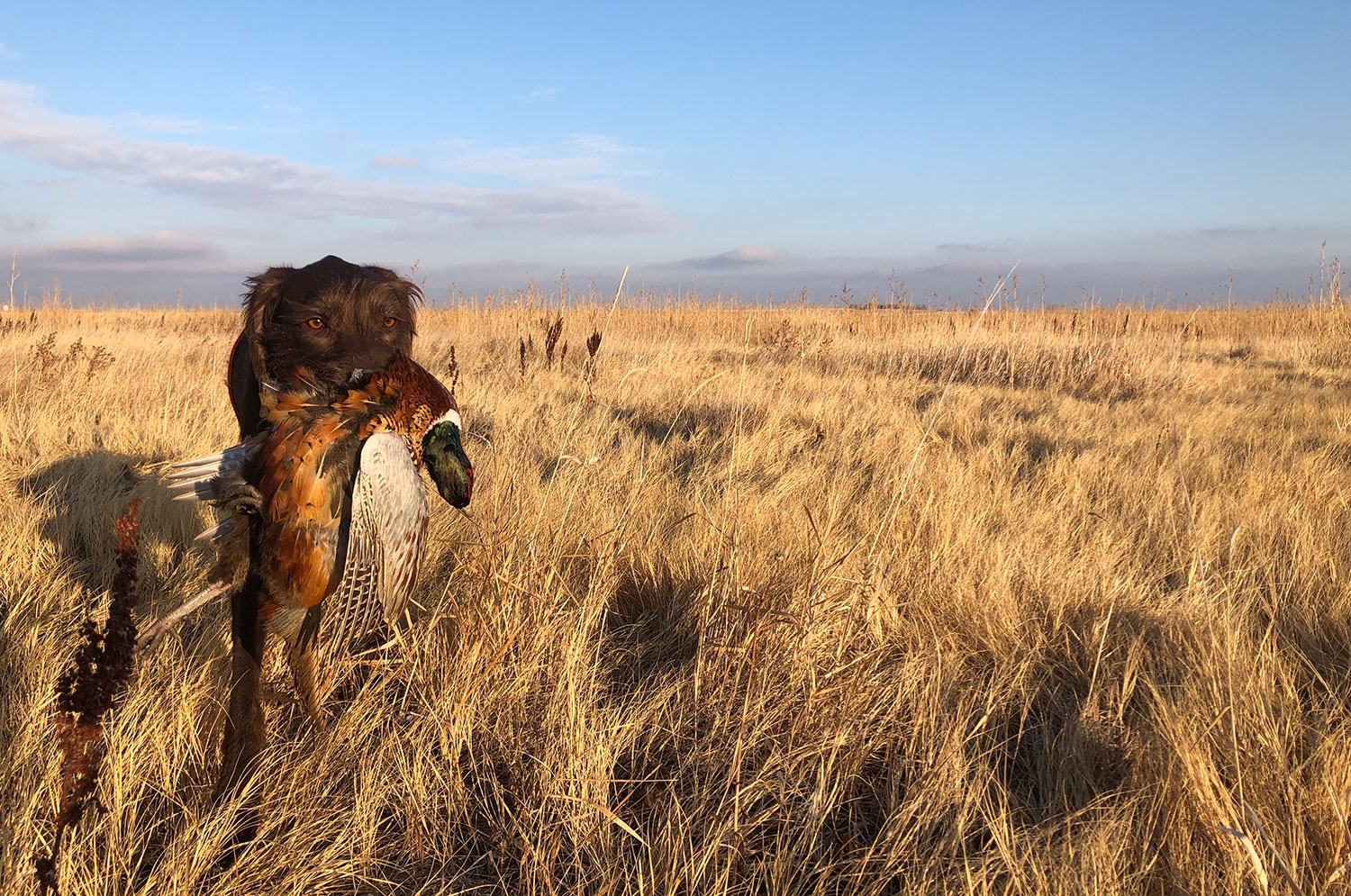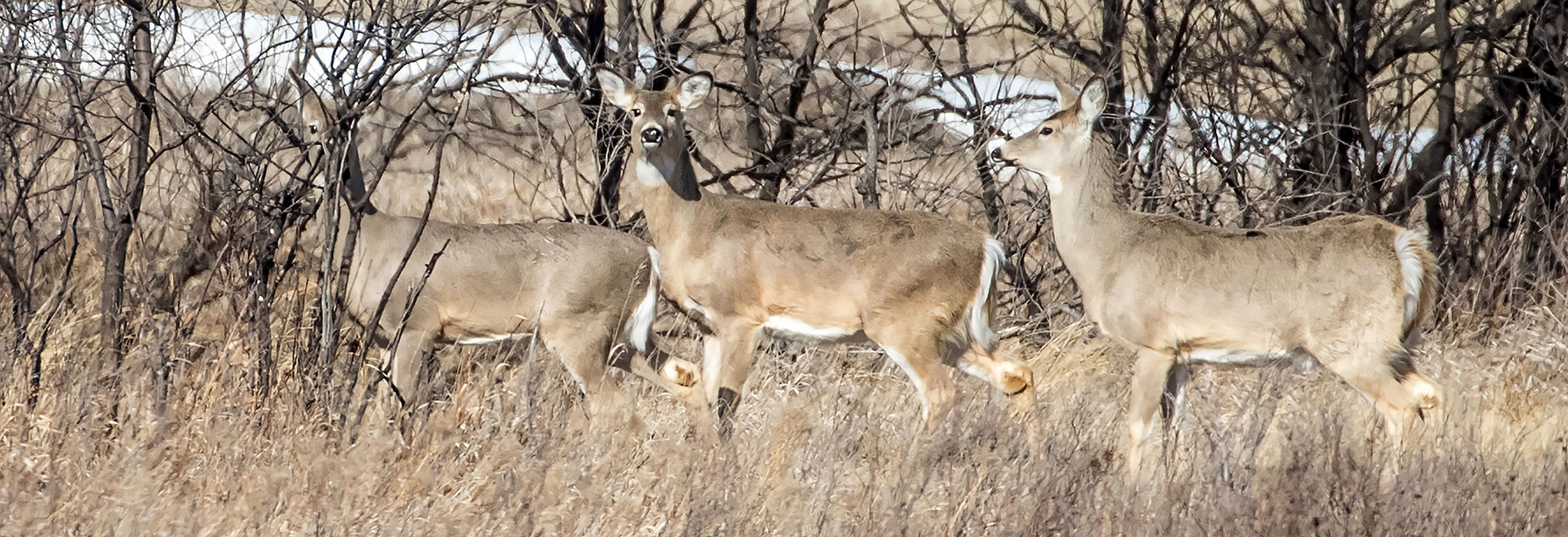
Champion for State’s Natural Resources to Retire
Terry Steinwand, director of the North Dakota Game and Fish Department, announced his retirement effective July 31, after nearly
40 years with the agency.
Steinwand was appointed director in January 2006 by then-Gov. John Hoeven. He was reappointed by Gov. Jack Dalrymple in 2010 and by Gov. Doug Burgum in December 2016. Steinwand began his career with the agency in 1982 as a fisheries biologist for the Garrison Diversion Unit. He was named fisheries division chief in 1989.
“Terry has been a champion for North Dakota hunters and anglers for nearly four decades, spending the last 15 of those years leading a high performing team that has earned North Dakota a national reputation as a sportsman’s paradise,” Burgum said. “From expanding hunting access through the PLOTS (Private Land Open To Sportsman) program to growing the state’s fishing opportunities to more than 400 managed waters with a world-class stocking program, Terry’s love and respect for the outdoors shines through in his work every day. We are deeply grateful for his leadership and legacy of responsible, effective management of our state’s fish and wildlife resources, and we wish him all the best in retirement.”
North Dakota OUTDOORS staff interviewed Steinwand about his years with the agency and what lies ahead.

NDO: In your 39-plus years as a fisheries biologist and leader of the agency, what comes to mind when considering North Dakota’s natural resources over time?
Steinwand: They change constantly. We can go from boom to bust in a real big hurry. When I took over as fisheries division chief in 1989, we were in the middle of a drought. And, of course, obligate species for water would be fish and not having a whole lot of water on the landscape, our fisheries weren’t doing very well. There were only about 185 lakes and some of those were pretty shallow at that point in time, and we were just trying to keep some recreational fishing in those lakes. Fast forward to 2006 when I became director, we were actually in the middle of a wet cycle, there were 3.2 million acres of CRP on the landscape, and we were really ramping up on the recreational fishing side of things, but even more so on pheasants, grouse, whitetail deer … they were doing fantastic, and we saw some tremendous hunting and fishing during that point in time. Since that time, we have lost about 2 million acres of CRP. We’ve seen some other challenges associated in managing the resource or producing that resource. Fisheries have continued to really climb though; our fisheries personnel have done a tremendous job. Over 400 lakes managed for recreational fisheries right now and I can’t think of one that’s not a great fishery at this point in time. And of course, our wildlife division has done a tremendous job of working our way back from a pretty low point in deer numbers. But again, one bad winter can set us back. We still need to continue working on the habitat issues.
NDO: Readers of NDO recognize that you’ve long been a champion of North Dakota and the hunting, fishing, trapping and other recreational opportunities available in the state. Why is that?
Steinwand: I got into this field because I love to hunt and fish. Everybody that buys a license evidently likes, but maybe doesn’t love it like I do, but at least likes to hunt and fish and enjoy the outdoors. I cannot say enough about North Dakota’s outdoors. I’ve ended every one of my Matters of Opinion columns with “enjoy the great North Dakota outdoors,” or something pretty close. And I’m proud of that. I’m proud to be part of the process, part of the team, part of that whole community that provides that opportunity. I want my grandkids – I want everybody’s kids and grandkids to enjoy what I’ve had the opportunity to enjoy. And if we can make it better, we should make it better.
NDO: During your 15 years as director, what were some of the biggest hurdles you and other agency leaders had to face in managing North Dakota’s natural resources?
Steinwand: Well, habitat … it’s always going to be habitat. Is there enough water, quality water, to keep those fish alive and help them grow, which is one reason aquatic nuisance species are a priority for the Department and should be and has to be for the next number of years. Because zebra mussels, curly leaf pondweed, Eurasian water milfoil, silver carp, all of those have the real potential to make the resource decline. On the wildlife side, again, its habitat, winter habitat. We always have winter in North Dakota. And if these animals don’t have a place to just have a little thermal cover, they’re not going to make it through winter, whether it’s a rooster pheasant or it’s that nice buck or those little fawns, which are the first to succumb to tough weather because they just don’t have the body reserves. Those are always going to be the challenges. Here at Game and Fish, we’re always looking at it like it’s never good enough, but we understand that we have to work with a lot of private landowners to get that. And private landowners across the state have been fantastic. Everybody that has hunted in North Dakota is aware of our PLOTS land, Private Land Open To Sportsmen program. That couldn’t happen without the cooperation of a whole pile of private landowners out there. We’re all part of a family here in North Dakota and it comes down to family working with family to get things done. Again, we don’t feel it’s ever going to be good enough unless we can get everybody who wants to go fishing has access to that lake, or everybody who wants a deer license gets a deer license. And again, that’s all habitat related. Will we ever get there? You know, that’s always going to be the goal. I’m not really sure we’re ever going to get there, because once you get there, you’re going to want to move that goalpost just a little bit farther. I want to keep the hunting and fishing heritage alive in North Dakota.

NDO: Was the electronic posting bill also one of the biggest challenges?
Steinwand: I wouldn’t say the electronic posting bill was a challenge. Hunting access and how hunters are able to access that land was the issue. A very, very contentious issue for years. This issue has been around for a long time and I can say in my eight legislative sessions as director, it came up in almost every one of them. I can’t put Game and Fish at the forefront in this because it was a real group effort between the conservation community and private landowners doing what needed to be done to make it work. And some people call it a compromise. I would rather call it a collaborative solution because the people got to know each other. They got to understand each other. And they said, “Yeah, we can make this work, this can work, and it’s going to change to some extent in the future.” This to me, if you want to look at in terms of a human life, this thing was just born. And, actually, the idea came out four years ago, it was just too early at that point in time. The technology wasn’t necessarily totally there. In the 2019 session, it started building itself and it was born this year, and it’s going to have to crawl a little bit before it’s able to walk and run. So, I fully expect it will because it had good support and detractors from both sides … some hunting groups, or hunting people, and some private landowners still don’t agree with it. And we’re probably going to see some, hopefully minor, glitches in it, but it’ll get better and better and better. And again, it’s a process I’m proud to be a part of as we are first in the United States to have electronic posting. Again, it’s just an option. Not everybody has to electronically post, you can still physically post, but you can electronically post also. Honestly, I’m going to try it out with our land and I’m going to put posters out there, too, because being the first year that it’s absolutely in effect, there’s going to be some mistakes made and we have to deal with that, too. And I hope private landowners understand that.
NDO: Are there any misconceptions that people might have about the North Dakota Game and Fish Department that you want to clear up?
Steinwand: I guess it would be the perception that we have all this authority, that we have all this power. We have some authority, but we have so much less than a lot of people think. Gosh, I remember in my early days as director, we were working on some elk issues with western ranchers, and they felt that we had the authority to do this and just bang do it. No, we didn’t and still don’t. It took a number of meetings for them to understand it, but they actually joked about it towards the end. I don’t have the authority and the Department doesn’t have the authority that a lot of people think, so to me that is the biggest misperception out there. And I don’t know if we’d want that kind of authority because you got to have that balance.

NDO: What are you most proud of, what do you want to hang your hat on from your 15-year run as Game and Fish Department director?
Steinwand: I’d say the people we’ve hired over the years. I’ve been asked, well, what’s your legacy? I never came into this job with an idea or a goal of leaving a legacy, that never even crossed my mind. But in thinking back on it, the biggest legacy in it is the people I’m leaving here who can do the job. Employees of the Game and Fish, division chiefs, section leaders, they’ve made this job relatively easy. We’ve done a great job of hiring the right people, the passionate people, the very smart people. And to me, that’s the best legacy anybody can have, because the public can be rest assured that although Terry Steinwand is gone, and I’m sure some people are glad Terry Steinwand is going to be gone, things aren’t going to change in terms of management of the fish and wildlife resource. You know, the person sitting at that seat next is going to recognize that we have a great team. Don’t mess with it too much.
NDO: A year from now, what are some of the things about Game and Fish that are going to pop in your head?
Steinwand: It’ll probably be that, gee whiz, it’s continually changing because there are a lot of retirements on the horizon. There’s no doubt about it. It’s changed a lot since I first started. I was a young pup and now I’m the old guy. What will pop into my mind? It will probably be something like, gosh, they’re doing a good job. I promised myself I’m not going to be the annoying ex-employee who says, well, “How come you’re not doing this? How come you’re not doing that?” No, I’m not doing that.
NDO: What is on your agenda now?
Steinwand: Once my boat is fixed, I’m going fishing. And when fall comes around, I’m going hunting. And I got a lot of fixing up as the honey-do list has gotten pretty long in the last 15 years. But I’m going to miss the people and I’m going to have to stay busy so I don’t totally miss the people. But yeah, hunting and fishing are going to be my priority. I have four grandkids from 1 to 5 years, not very old yet, and I want them to have the same love of the outdoors that I gained. Granted, I had a little different upbringing on a farm and was able to do stuff that they aren’t able to do right now. Even so, I want to give them that opportunity. Let’s go out shore-fishing at a little lake. Let’s go walk in the pasture. I want to show them what I was able to do as a kid.
NDO: Before you walk out the door, what advice do you give the person filling your seat?
Steinwand: Listen, listen, very carefully. Listen to what’s being said. Balance the interests. When I was hired by then-Governor Hoeven, he gave me some real good advice: balance the interests. And I will guarantee you that’s going to be the toughest thing you have to do. Because, again, coming from a farm background, I understand what farmers and ranchers are going through, it’s tough times out there. They can get some boom times, but for the most part, it’s pretty tough. But I also understand what my responsibility was as Game and Fish director and, of course, that’s the agency trying to get those populations sustainable and growing. Balancing interests has always been the toughest job for me and will remain so for the next person. You know, this has been the greatest job in the world, working with the greatest people in the world. I’m going to miss the people, but I’m not going to miss the stress.


